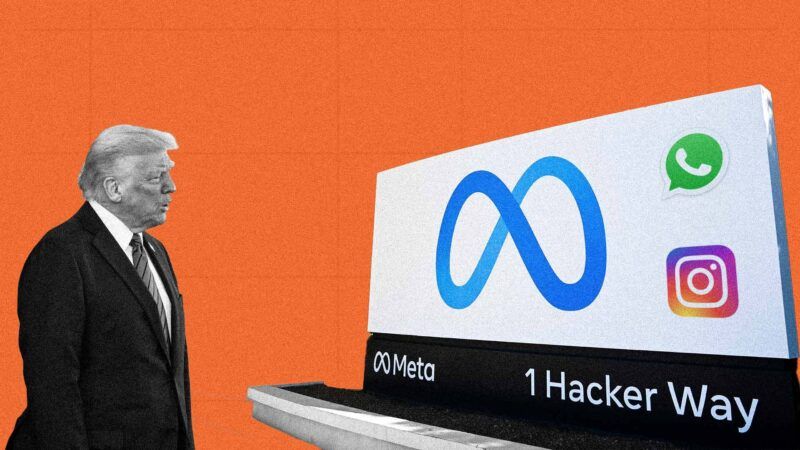The Trump Administration Wages War on Meta
Mark Zuckerberg's donations haven't stopped the Federal Trade Commission from going after his company.

The Federal Trade Commission (FTC) is resuming its antitrust attack on Meta. After first suing the tech giant in 2020, the Trump FTC now alleges that Meta violated the Sherman Antitrust Act by maintaining a personal social networking monopoly by purchasing Instagram and WhatsApp. But investing in software and attracting billions more users is a sign of competitiveness, not sclerosis.
Meta acquired Instagram in April 2012 for $1 billion in cash and Meta (then Facebook) shares and purchased WhatsApp for $19 billion in February 2014. The first Trump administration's lawsuit against Meta was dismissed in June 2021, after the U.S. District Court for the District of Columbia ruled the commission failed to show "that Facebook has monopoly power in the market for Personal Social Networking (PSN) Service." The FTC amended its complaint and the case was allowed to proceed to discovery.
The FTC accused Meta of acquiring Instagram "to neutralize a competitor," acquiring WhatsApp to "neutralize a competitive threat to its personal social networking monopoly," and leveraging network effects—an economic phenomenon where a product becomes more valuable as more people use it—to insulate itself from competition. While Instagram could rightly be seen as a genuine competitor of Facebook, its growth suggests that consumers derive more value from the platform now than they did before Meta's acquisition.
Instagram grew from 50 million monthly active users (MOAs) in 2012 to two billion MOAs as of February 2025. WhatsApp, an instant messaging app, not a social media platform (a fact the FTC acknowledges in its opening statement slides), also saw growth. In the month of its acquisition, WhatsApp had 465 million MOAs and grew to nearly 3 billion users by June 2024.
Brian Albrecht, chief economist at the International Center for Law and Economics, argues that network effects not only benefit consumers, but aren't necessarily anticompetitive. Albrecht points to TikTok as a firm that successfully entered the attention economy market and gained "hundreds of millions of users by offering a superior experience" despite preexisting social media networks. MySpace, meanwhile, exemplifies the bidirectional growth dynamics of networks: "When people start leaving the platform, each departure makes the network less valuable to those who remain, potentially triggering a mass exodus that feeds on itself."
The New York Times reports that the FTC's lead litigator in the case, Daniel Matheson, said "firms must compete if they want to succeed," but Meta "decided that competition was too hard and it would be easier to buy out their rivals."
The FTC also argues that Meta "overpaid" for Instagram and WhatsApp, according to the Times. Considering the extent to which the two apps' user bases grew and the billions of dollars that Meta has earned and projects to earn from them, it is unclear how the commission defines the concept.
If Meta had paid billions of dollars to acquire the intellectual property rights and shut down the services, a compelling antitrust case could be made on consumer welfare grounds. But Meta did just the opposite; the company invested in the platforms, improved them, and garnered billions more users as a result.
